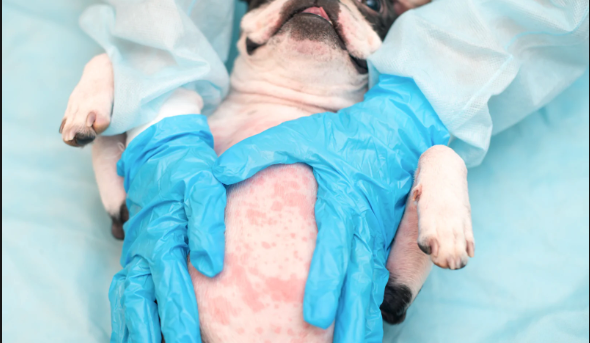Hives on Dogs: What to Do If Your Dog Has an Allergic Reaction
Hives on dogs can be extremely uncomfortable. If you have ever had hives after eating something you are allergic to, you know just how uncomfortable they can be.
These raised, often itchy spots can be restricted to a small area or could spread across the whole body. While they are usually short-lived and relatively harmless, they can occasionally be a cause for concern. Keep reading to learn more about hives on dogs and what to do about them:
Hives on Dogs: How to Spot Them
Depending on the severity or location, hives can look a little different on each dog. They usually present as small red bumps, but they can also be swollen or fluid filled. Hives are often itchy, and your dog might scratch them so often or so hard that they start to bleed. If there is any swelling on or near the nose or throat, this is considered a veterinary emergency and requires immediate medical care.
Common Causes of Hives on Dogs
Just like in humans, dog hives are the result of an allergic reaction. While your dog could have an allergy to many different items, these tend to be some of the most common that bring on hives in canines:
- Insect bites
- Food
- Environmental allergens (like pollen)
- Medication
- Products containing chemicals like home cleaners
- Heat
- Stress
- Genetics
- Anxiety (while rare, some dogs do develop hives when they feel especially anxious)
Sometimes it can be difficult to identify a trigger. If your dog gets hives regularly, you might want to try to eliminate foods and environmental factors until you can narrow it down.
What to Do If Your Dog Has Hives
Hives often pop up unexpectedly. If you’ve never dealt with them before, it can be difficult to know how to start helping your pup. In many cases, the hives will go away on their own within an hour or so.
If they have already been present for a few hours, you should first call your veterinarian. They may have at-home recommendations to help your dog get past the allergic reaction. If the hives will not go away or they seem to be spreading, your veterinarian might want you to bring your dog in for an examination. Often an antihistamine or some steroids will get rid of them. It is important to only give medication under the supervision of your vet.
Investigate the Potential Cause of the Hives
If you do not want your dog to have another allergic reaction in the future, you might want to play detective to try to determine the allergen causing hives on dogs. Work with your veterinarian to start to narrow down the potential allergens and get a test to see if you can find the cause. You should also pay close attention to your dog at home to see if you notice any patterns with behavior and allergic reactions.
Oakland Veterinary Referral Services is here to help you get the specialized veterinary care you need to improve your pet’s overall health and wellness. Whether you need in-depth allergy testing or want to look into alternative therapies, we are here for you. To learn more about our specialized veterinary and emergency services, please call (248) 334-6877.



